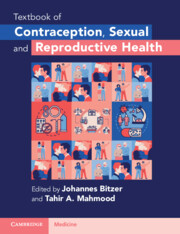Book contents
- Textbook of Contraception, Sexual and Reproductive Health
- Textbook of Contraception, Sexual and Reproductive Health
- Copyright page
- Contents
- About the Authors
- Contributors
- Section 1 Sexual and Reproductive Health and Rights, Public Health Aspects and Prevention in Sexual and Reproductive Healthcare
- Chapter 1 Sexual and Reproductive Health and Rights
- Chapter 2 European Laws on Sexual and Reproductive Health and the Different Policies regarding Access to Sexual and Reproductive Healthcare
- Chapter 3 The Main Threats to Sexual and Reproductive Health and the Principal Components of Good Sexual and Reproductive Healthcare
- Chapter 4 The Principles and Roles of Sexuality Education
- Chapter 5 Sexual Reproductive Health
- Chapter 6 General Principles of Preventive Medicine in Sexual and Reproductive Healthcare
- Chapter 7 Screening in Sexual and Reproductive Healthcare
- Chapter 8 Reproductive Life Plan and Preconception Care, Including Vaccination
- Section 2 Sexual and Reproductive Healthcare
- Section 3 Sexual Healthcare
- Section 4 Sexual and Reproductive Health Indicators and Policies
- Index
- References
Chapter 4 - The Principles and Roles of Sexuality Education
from Section 1 - Sexual and Reproductive Health and Rights, Public Health Aspects and Prevention in Sexual and Reproductive Healthcare
Published online by Cambridge University Press: 16 January 2024
- Textbook of Contraception, Sexual and Reproductive Health
- Textbook of Contraception, Sexual and Reproductive Health
- Copyright page
- Contents
- About the Authors
- Contributors
- Section 1 Sexual and Reproductive Health and Rights, Public Health Aspects and Prevention in Sexual and Reproductive Healthcare
- Chapter 1 Sexual and Reproductive Health and Rights
- Chapter 2 European Laws on Sexual and Reproductive Health and the Different Policies regarding Access to Sexual and Reproductive Healthcare
- Chapter 3 The Main Threats to Sexual and Reproductive Health and the Principal Components of Good Sexual and Reproductive Healthcare
- Chapter 4 The Principles and Roles of Sexuality Education
- Chapter 5 Sexual Reproductive Health
- Chapter 6 General Principles of Preventive Medicine in Sexual and Reproductive Healthcare
- Chapter 7 Screening in Sexual and Reproductive Healthcare
- Chapter 8 Reproductive Life Plan and Preconception Care, Including Vaccination
- Section 2 Sexual and Reproductive Healthcare
- Section 3 Sexual Healthcare
- Section 4 Sexual and Reproductive Health Indicators and Policies
- Index
- References
Summary
Sexual education (SE) started in Sweden in 1955, when it became mandatory in schools. In the 1970s and 1980s, more Western European countries adopted it – first other Scandinavian countries, then other European nations such as Germany (1968) and Austria (1970). In the Netherlands and Switzerland, SE began in the 1970s but was not yet a mandatory subject. The introduction continued during the rest of the century, first in France and the United Kingdom, and from there it spread further. In only a few European countries has SE not yet been introduced in schools.
- Type
- Chapter
- Information
- Publisher: Cambridge University PressPrint publication year: 2024



